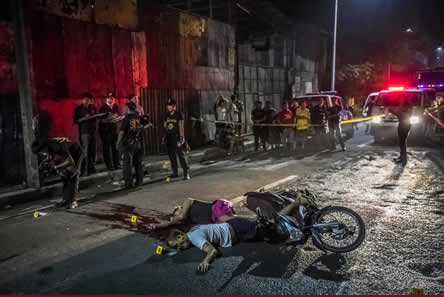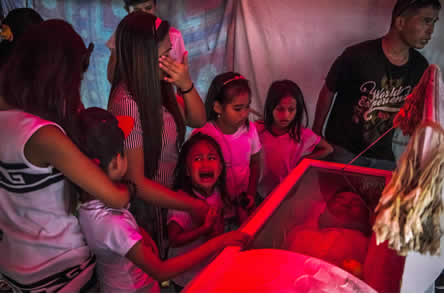|

In what has now become an all too common scene, two
individuals found dead in Philippine streets. Author-supplied photo
 he New York Times
published four major articles about Philippine Pres. Rodrigo Duterte
from December 6 through December 14, 2016 including “They are
slaughtering us like animals!” (December 7, 2016), where New York Times’
photojournalist Daniel Berehulak documented 57 murder victims at 41
sites in the 35 days he spent in Manila. he New York Times
published four major articles about Philippine Pres. Rodrigo Duterte
from December 6 through December 14, 2016 including “They are
slaughtering us like animals!” (December 7, 2016), where New York Times’
photojournalist Daniel Berehulak documented 57 murder victims at 41
sites in the 35 days he spent in Manila.
“I witnessed bloody
scenes just about everywhere imaginable — on the sidewalk, on train
tracks, in front of a girls’ school, outside 7-Eleven stores and a
McDonald’s restaurant, across bedroom mattresses and living-room sofas.
I watched as a woman in red peeked at one of those grisly sites through
fingers held over her eyes, at once trying to protect herself and permit
herself one last glance at a man killed in the middle of a busy road.,”
Berehulak wrote.
“I have worked in 60
countries, covered wars in Iraq and Afghanistan, and spent much of 2014
living inside West Africa’s Ebola zone, a place gripped by fear and
death. What I experienced in the Philippines felt like a new level of
ruthlessness: police officers’ summarily shooting anyone suspected of
dealing or even using drugs, vigilantes’ taking seriously Mr. Duterte’s
call to “slaughter them all,” the news photographer added.
Duterte was just
getting started. “You can expect 20,000 or 30,000 more,” he publicly
announced.
LINK
DUTERTE
'USED TO DO IT PERSONALLY'
In the most recent
article on the subject, Duterte personally boasted to business leaders
in Manila on December 13 that “as mayor of Davao, he had patrolled the
city's streets by motorcycle looking for suspected criminals to kill.”
“In Davao, I used to
do it personally — just to show to the guys that if I can do it, why
can’t you?” Duterte said. Goldman wrote that “Mr. Duterte told business
leaders at a meeting in Manila, explaining how he goaded police officers
to gun down suspects.
“And I’d go around in
Davao with a motorcycle, with a big bike around, and I would just patrol
the streets, looking for trouble also,” he said, “I was really looking
for a confrontation, so I could kill.”
LINK
Duterte has not been
content with just taking the law into his own hands and personally
goading his police officers to follow his brazen example, he has also
been actively encouraging the public to follow his example. At a victory
rally in Davao City held after the elections, in a speech televised
nationally, Duterte asked Filipinos should take it upon themselves to
kill those involved with drugs. (“Kill drug dealers and I'll give you
a medal, says Philippines president”, The Guardian, June 5, 2016).
"Please feel free to
call us, the police, or do it yourself if you have the gun," he said,
offering a reward to anyone who complied. Duterte has also assured
police and the military that he will take responsibility for
extrajudicial killings and protect anyone who assassinates suspects from
being held criminally responsible.”
Among the estimated
millions of readers of the New York Times, and the syndicated articles
that appear in local newspapers throughout the US, are employees of the
US Department of Homeland Security (DHS) who are tasked with enforcing
US immigration laws. They are now aware that Duterte's supporters in the
Philippines and in the United States may include people who have
followed their president's advice and engaged in extrajudicial killings
or have otherwise actively supported it.
These DHS officials
may now inquire of Filipinos intending to visit the US as tourists and
those in the US seeking to apply for permanent residence or for
naturalization if they approve of Duterte’s extrajudicial killings as
part of his war against drugs and if they were involved in or had
participated in “any way" in the extrajudicial killings.
Extrajudicial killings
may not be prosecuted in the Philippines under Duterte – as proven by
the cold-blooded execution of Leyte Mayor Rolando Espinosa by 24 police
officers on November 3 - but they are crimes in the United States and
supporting their practice in the Philippines is a violation of US
immigration law.
ANTI-ATROCITY ALIEN DEPORTATION ACT
U.S. Immigration and
Nationality Act Section 212 lists the “classes of aliens ineligible to
receive visas and ineligible for admission” to the United States.
Included under subsection E are “participants in Nazi persecutions,
genocide or the commission of any act of torture or extrajudicial
killing”.
Under this subsection
E is:
“iii)
COMMISSION OF ACTS OF TORTURE OR EXTRAJUDICIAL KILLINGS- Any alien
who, outside the United States, has committed, ordered, incited,
assisted, or otherwise participated in the commission of-- (I) any
act of torture, as defined in section 2340 of title 18, United
States Code; or (II) under color of law of any foreign nation, any
extrajudicial killing, as defined in section 3(a) of the Torture
Victim Protection Act of 1991 (28 U.S.C. 1350 note), is
inadmissible.”
This new and expanded
definition of “extrajudicial killing” became law in 2004 under
Title XII Anti-Atrocity Alien Deportation Act of 2004.
As reported in the
Congressional Record of deliberations on this new law, “subsection (a)
would add a new clause to Section 8 USC Sec. 1182(a)(3)(E) that would
trigger operation of the inadmissibility ground if an alien has
“committed, ordered, incited, assisted or otherwise participated in
“acts of torture…or extrajudicial killings as defined in the Torture
Victim Protection Act.”
The Torture Victim
Protection Act of 1991 defines extrajudicial killing as a “deliberate killing without previous judgment pronounced by a regularly
constituted court affording all the judicial guarantees which are
recognized as indispensable by civilized peoples.”
Filipinos in the
Philippines who apply online for a tourist visa will be asked on Form
DS-160 if they have ever “committed, ordered, incited, assisted or
otherwise participated in “acts of torture…or extrajudicial killings as
defined in the Torture Victim Protection Act.” If they truthfully
answer that they “assisted” Duterte by enthusiastically supporting his
extrajudicial killings, their tourist visa application will likely be
rejected.
If they lie and
somehow enter the US, and they find some way to be petitioned for a
green card, they will have to fill out Form I-485, their Application for
Adjustment of Status to the United States. “Part 3 Processing
Information” asks on #14 “Have you EVER ordered, incited, called for,
committed, helped with, or otherwise do any of the following: a. Acts
involving torture or genocide? b. Killing any person?...”
If they lie and
Immigration and Customs Enforcement (ICE) officials subsequently learn
from their Facebook posts that they have "helped with" extrajudicial
killings by actively endorsing and cheering Duterte's blood lust, then
their applications because they perjured themselves to obtain an
immigration benefit.
If they somehow
acquire their green cards by lying about their support for Duterte’s EJK
and they then apply for naturalization as a US citizen, they will have
to fill out Form N-400. In it on Part 12 #14, they will be asked: “Were
you EVER involved in any way with any of the following: A. Genocide? B.
Torture? Killing or trying to kill someone?...”
“Any way” is quite
broad and it can certainly be argued that endorsing/cheering Duterte’s
“slaughter” of innocents (they are all innocent because they were never
even charged with, much less convicted of, a crime) is a “way” of being
involved in the extrajudicial killings of Duterte.
Duterte's supporters
in the US have banded together to form Diehard Duterte Supporters (DDS),
which is notable because the group's initials match that of the dreaded
Davao Death Squad (DDS) which was responsible for the murders of more
than 1500 drug suspects in Davao during Duterte’s 20 year term as city
mayor. If these supporters list their membership in DDS in their
immigration applications, they may likely be questioned about their
organization's beliefs and if they personally endorse Duterte's
extrajudicial killing of drug suspects.
The same Title XII
Anti-Atrocity Alien Deportation Act of 2004 that may bar Duterte's EJK
supporters from being admitted into the US will also bar Pres. Duterte
himself from visiting the United States. The precedent was established
as recently as April of this year when Afghanistan’s First Vice
President Abdul Rashid Dostum was advised by the US State Department
that he would not be issued a visa to visit the US based on what Dostum
did in 2001 when he ordered the suffocation of 2,000 Taliban prisoners
in container trucks in the incident known as the Dasht-i-Leili Massacre.
While Duterte still
enjoys public support in the Philippines, the latest Social Weather
Stations (SWS) survey, reported in Rappler's December 19, 2016 issue,
found that 78% of Filipinos are "worried that they, or someone they
know, will be victims of extrajudicial killings”(45% "very worried," 33%
"somewhat worried").
THE LATEST
EJK COUNT
These are the latest
statistics compiled by the Philippine National Police (PNP) since
Duterte became president:
6,173 - total number
of people killed since July 1, 2016
2,124 - suspected drug
personalities killed in police operations, as of December 18
4,049 - victims of
extrajudicial or vigilante-style killings, as of December 15
Perhaps the time has
come for Duterte’s EJK supporters in the US to also be “very worried” or
even “somewhat worried” that their enthusiastic backing of Duterte may
have unintended dire immigration consequences for them in the United
States.

Relatives in the wake of an EJK (extrajudicial killing)
victim. Author-supplied photo
FEAST OF
THE HOLY INNOCENTS
On December 28,
Catholics all over the world will celebrate the Feast of the Holy
Innocents to commemorate the massacre by King Herod who was seeking the
boy who would be Jesus. "When Herod realized that he had been outwitted
by the Magi, he was furious, and he gave orders to kill all the boys in
Bethlehem and its vicinity who were two years old or under, in
accordance with the time he had learned from the Magi. Then what was
said through the prophet Jeremiah was fulfilled: "A voice is heard in
Ramah, weeping and great mourning, Rachel weeping for her children and
refusing to be comforted, because they are no more" Matthew 2:16-18.
The families of the
EJK victims are weeping and in great mourning this Christmas. Pray for
them. Published 12/28/2016
(Send comments to
Rodel50@gmail.com
or mail them to the Law Offices of Rodel Rodis at 2429 Ocean Avenue, San
Francisco, CA 94127). |